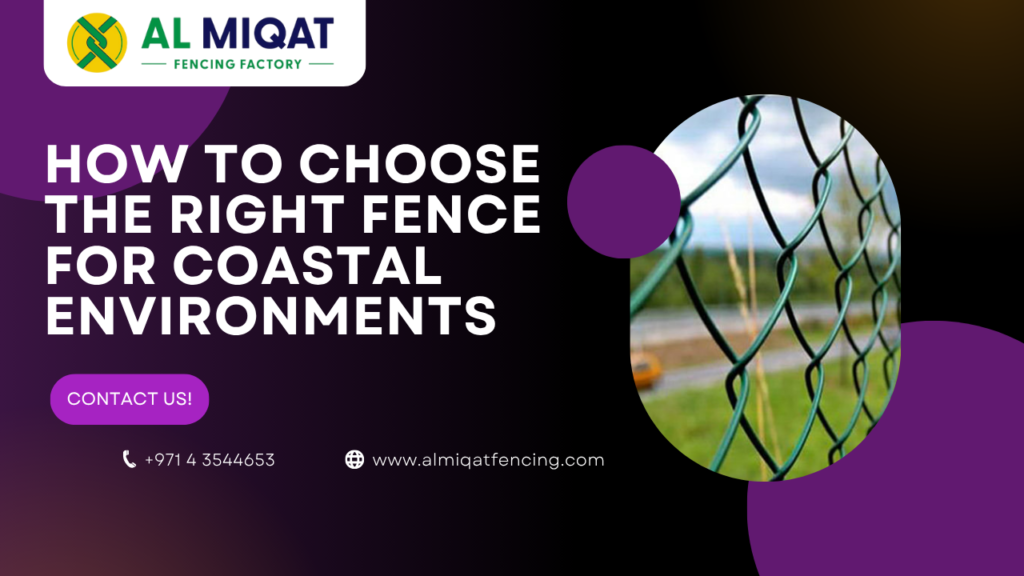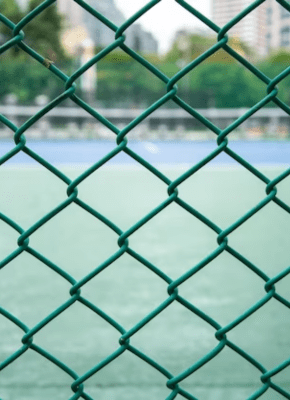Coastal environments are known for their beauty, but they also present a unique set of challenges for property owners. High humidity, salt-laden air, strong winds, and corrosion risks can significantly shorten the lifespan of conventional fencing materials. That’s why selecting the right fence for a coastal area requires careful consideration of durability, maintenance, and resistance to weather conditions. At Al Miqat Fencing Factory, we understand these environmental demands and offer expert solutions tailored to coastal applications.
This blog will guide you through the essential factors to consider when choosing a fence for coastal environments and introduce you to fencing materials that perform best in such conditions.
1. Understand the Challenges of Coastal Climates
Before deciding on a fence type, it’s important to understand the unique environmental factors at play:
- Saltwater corrosion: Salt in the air accelerates rusting and metal deterioration.
- Humidity and moisture: High humidity promotes mold and material degradation.
- Strong winds and storms: Coastal areas are prone to gusty winds that can damage poorly anchored fencing.
- Soil conditions: Sandy or salty soil can weaken fence posts and cause leaning over time.
These conditions demand a fence material that can withstand nature’s extremes while maintaining structural integrity and appearance.
2. Choose the Right Materials
Not all fencing materials are created equal—especially in coastal regions. Here are the best options based on our industry experience:
- PVC-Coated Chain Link Fencing
- Why it works: The vinyl or PVC coating protects the underlying steel from salt corrosion, extending the lifespan of the fence.
- Benefits: Low maintenance, rust-resistant, flexible design options.
- Applications: Residential, industrial, and commercial properties.
- Stainless Steel Fencing
- Why it works: Stainless steel offers superior corrosion resistance and does not rust easily.
- Benefits: Long-lasting, high strength, sleek appearance.
- Applications: High-security zones, marine installations, and coastal villas.
- Aluminum Fencing
- Why it works: Aluminum is naturally rust-resistant and performs well in salt air.
- Benefits: Lightweight, durable, low maintenance, and customizable.
- Applications: Decorative fencing for coastal homes, resorts, and parks.
- Composite or Vinyl Fencing
- Why it works: These synthetic materials are not susceptible to rot or rust.
- Benefits: Moisture-resistant, available in various designs, easy to clean.
- Applications: Residential boundaries and decorative fencing.
3. Prioritize Durability and Coatings
Even the most durable materials can degrade without proper coating or treatment. When choosing a fence for coastal areas, look for:
- Hot-dip galvanization for steel fencing.
- UV-stabilized PVC coating to prevent cracking and fading.
- Powder-coated finishes for enhanced rust resistance and appearance.
At Al Miqat Fencing Factory, we ensure that our fences are built with weather-proof coatings and treated to meet the highest standards of durability.
4. Consider Fence Design for Wind and Visibility
Coastal properties often enjoy beautiful views—but they also face high wind pressure. Your fence design should balance aesthetics with structural strength:
- Open designs like chain link fences allow wind to pass through, reducing pressure.
- Reinforced posts and deep anchoring are essential in sandy or loose soil.
- Custom height and panel spacing can be tailored to suit both privacy and airflow needs.
Our team at Al Miqat helps you choose the optimal design that complements your property’s layout while withstanding coastal winds.
5. Ease of Maintenance
Coastal fences require regular cleaning and inspections. Choose a fence that is easy to maintain:
- PVC-coated fences only need occasional washing to remove salt deposits.
- Stainless steel requires minimal upkeep with occasional wiping.
- Avoid untreated wood, as it can absorb moisture and degrade quickly.
6. Compliance with Local Regulations
Some coastal areas have specific regulations on fence height, materials, and placement to protect natural views or wildlife. Ensure that your fence complies with:
- Local zoning laws
- Environmental guidelines
- Marine or coastal construction codes
Al Miqat Fencing Factory offers full consultation to help clients navigate these regulations and ensure hassle-free installation.
Call to Action
Looking for a fence that stands strong against salt, wind, and sea?
At Al Miqat Fencing Factory, we specialize in high-performance fencing solutions built for coastal resilience. Whether you need PVC-coated chain link, stainless steel, or aluminum fencing, our products are engineered to last in the toughest environments.
📞 Contact us today for expert advice and customized fencing solutions tailored to your coastal property.
Visit our website or reach out to our team to request a quote or schedule a consultation.
Conclusion
Choosing the right fence for coastal environments is not just about aesthetics—it’s about making a smart, long-term investment. The harsh conditions of coastal areas demand materials and designs that can resist corrosion, handle strong winds, and require minimal upkeep.
By working with a trusted fencing manufacturer like Al Miqat Fencing Factory, you get access to expert guidance, premium materials, and durable fencing systems that are proven to perform in marine climates.
Protect your property. Preserve your view. Choose coastal-ready fencing from Al Miqat Fencing Factory.


